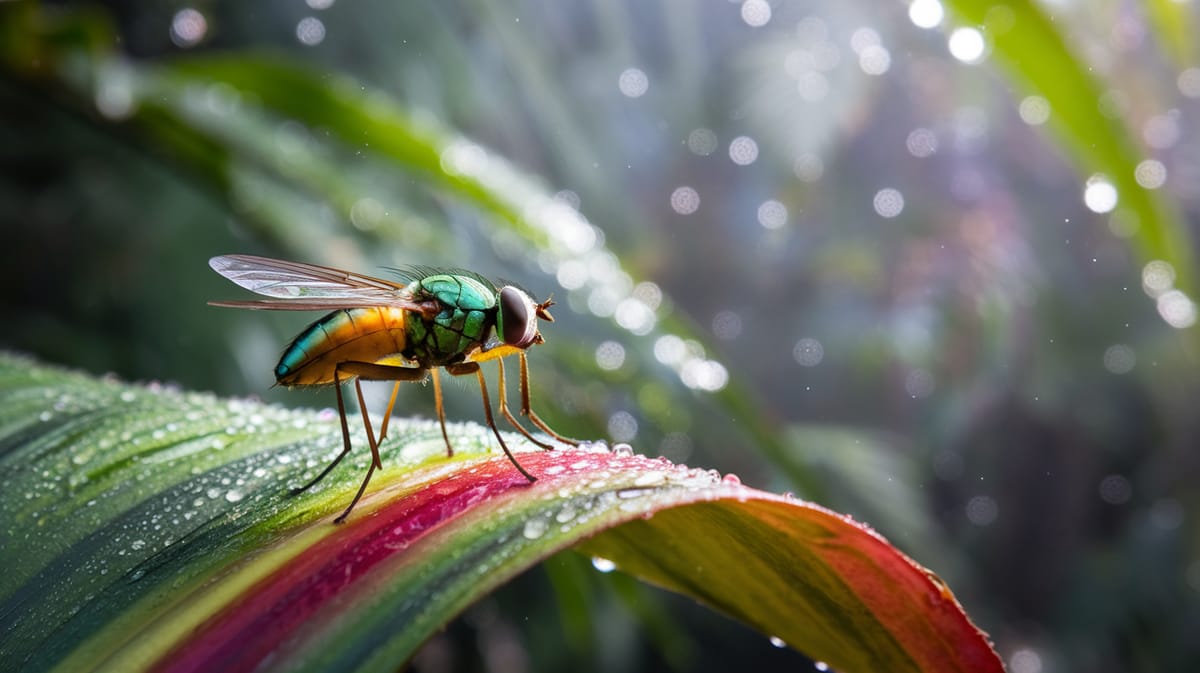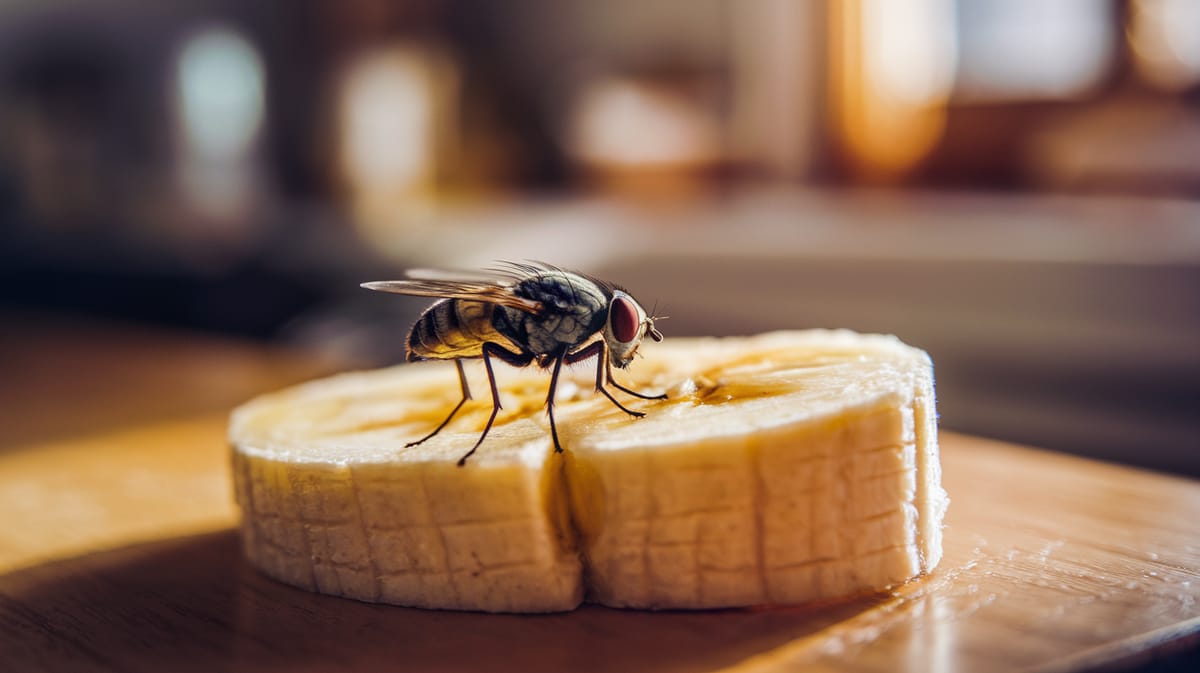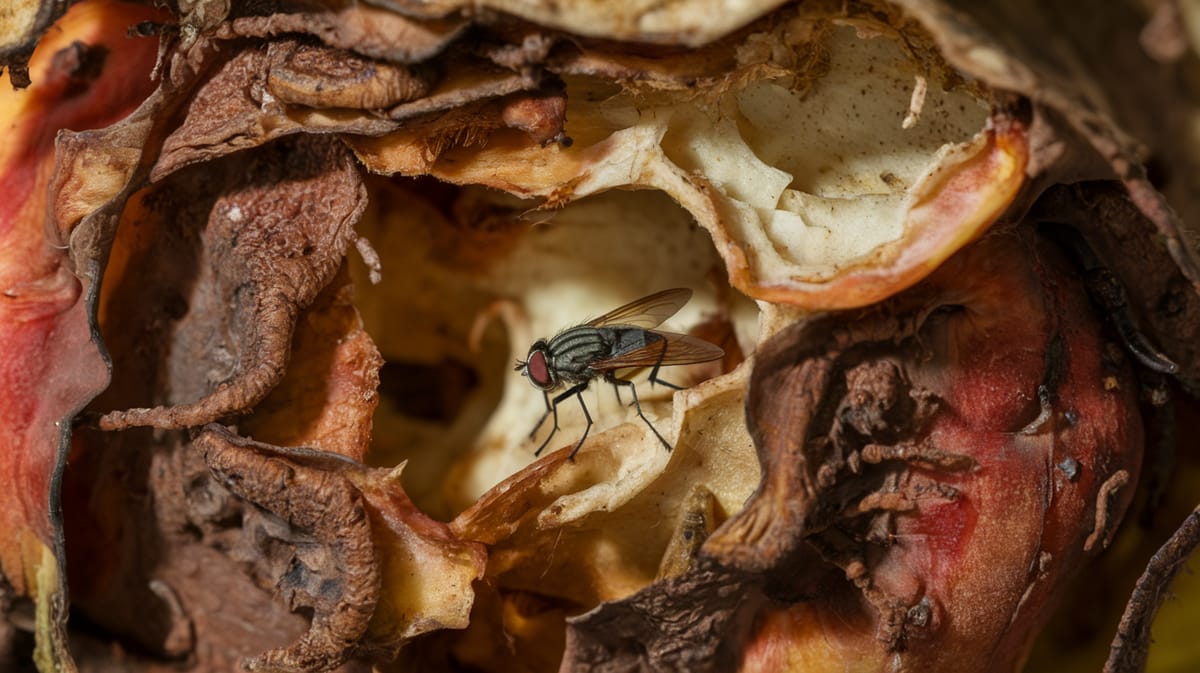Fruit Fly
Tiny yet formidable, the Fruit Fly thrives in diverse environments, playing a crucial role in scientific research and ecological balance. This insect aids in decomposing organic matter and advancing genetic studies.

Key Insights at a Glance
Did You Know?
Taxonomy & Classification
Fruit flies, known for their rapid reproduction and genetic adaptability, play a crucial role in decomposition and ecological balance. Let's understand the evolutionary journey and classification of these remarkable decomposers.
Species Diversity
The genus Drosophila includes over 1,500 species, highlighting extensive adaptability and distribution across diverse environments worldwide.
Ancient Origins
Fruit flies have been evolving since the Cenozoic Era, adapting to global changes and thriving in various ecological niches.
Lifecycle and Growth
A remarkable journey of transformation from Egg to Adult.
Egg
Tiny eggs are laid on fruit surfaces, each about 0.5 mm in size, starting the life cycle of the fruit fly.
Larva
Larvae, or maggots, burrow into fruit, feeding voraciously and growing rapidly before pupation begins.
Pupa
Encased in a hardened shell, pupae undergo metamorphosis, transforming from larval to adult form within.
Adult
Fully formed adults emerge, ready to reproduce within a day, continuing their brief but prolific life cycle.
Dietary Habits
A versatile feeder with a keen sense for fermentation, it thrives on sugars, yeast, and microbes found in decaying fruit.
| DIET TYPE | DESCRIPTION |
|---|---|
| Primary Diet | Primarily feeds on sugars from rotting fruits, utilizing specialized mouthparts to break down soft tissues. |
| Secondary Diet | Consumes yeast and bacteria, which are crucial for its development and nutrient absorption. |
| Occasional | Occasionally feeds on plant sap and other decaying organic matter when fruit sources are scarce. |

Behaviour and Adaptations
Discover the fascinating adaptations that make the Fruit Fly a thriving survivor in diverse environments.
Rapid Reproduction
Quick lifecycle allows swift population growth and adaptation to environmental changes.
Olfactory Acuity
Highly sensitive to odors, aiding in locating fermenting fruits efficiently.
Flight Agility
Exceptional maneuverability helps evade predators and explore new food sources.
Ecosystem Impact
Fruit flies play a crucial role in maintaining ecological balance through decomposition and nutrient cycling.
Decomposition Drivers
Speed up the breakdown of organic matter, enriching soil quality.
Pollination Partners
Assist in pollinating various plants, supporting biodiversity.
Food Web Contributors
Serve as a primary food source for many predators, maintaining food web dynamics.
Conservation Challenges
Understanding and addressing the major threats to Fruit Fly populations.
Chemical Exposure
Pesticides diminish fruit fly numbers, affecting ecological roles and food webs.
Habitat Loss
Urbanization and agriculture reduce breeding and feeding areas for fruit flies.
Climate Change
Temperature shifts alter fruit fly reproductive cycles and distribution.
Frequently Asked Questions
How long do Fruit Fly live?
Fruit flies typically live for about 40 to 50 days under optimal conditions. Their lifespan can vary based on environmental factors like temperature and food availability.
What do Fruit Fly eat?
Fruit flies feed on fermenting fruits and vegetables. They are attracted to overripe or decaying produce, where they consume yeast and microorganisms found on these surfaces.
Are Fruit Fly poisonous?
Fruit flies are not poisonous. They are considered a nuisance rather than a threat and do not pose any direct harm to humans through bites or stings.
Are Fruit Fly endangered?
Fruit flies are not endangered. They are widespread and abundant across the globe, thriving in diverse environments where fermenting food is available.
What do Fruit Fly symbolize?
Fruit flies often symbolize transformation and change due to their rapid life cycle and adaptability. In some cultures, they represent a reminder of persistence and resilience.
Do Fruit Fly bite?
Fruit flies do not bite humans. They lack the mouthparts necessary for biting and are primarily attracted to fermenting food sources rather than human hosts.
What color are Fruit Fly?
Fruit flies are generally tan or light brown with distinctive red eyes. Their small size and coloration help them blend into their environments effectively.
Does a Fruit Fly have wings?
Yes, fruit flies have wings. They are capable fliers and use their wings to move quickly between food sources, aiding in their ability to spread rapidly.
What does a Fruit Fly look like?
Fruit flies are small insects, about 1/8 inch long, with tan bodies, red eyes, and transparent wings. Their compact size and coloration make them easily recognizable.
Is a Fruit Fly an insect?
Yes, a fruit fly is an insect. It belongs to the order Diptera, which includes all true flies, characterized by a single pair of wings and compound eyes.
Related Insects
Discover insects with similar characteristics to Fruit Fly - including shared habitats, diets, and taxonomic classifications
Share this profile
Help others discover Fruit Fly
